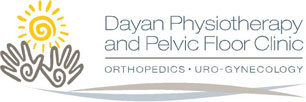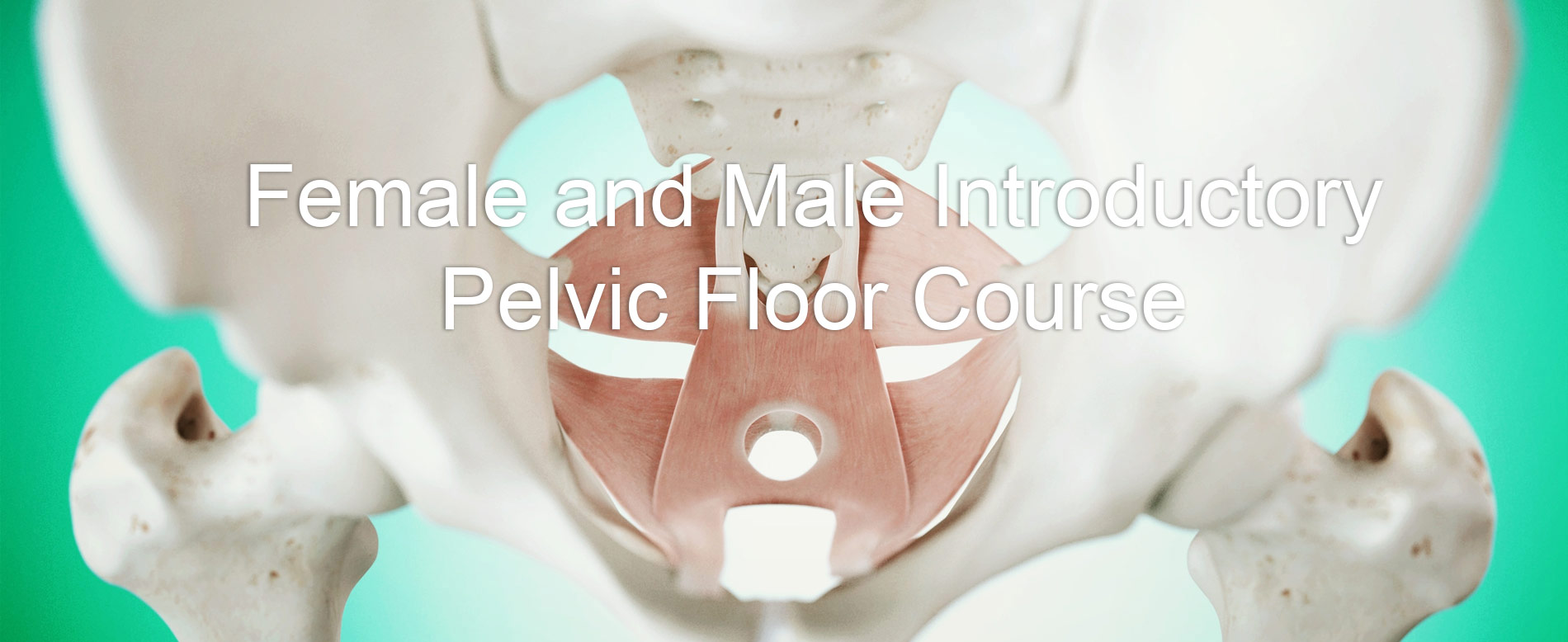Female and Male Urinary/Fecal Incontinence and Pelvic Organ Prolapse
An intensive intro course
Why choose our courses?
Course Information
Female and Male Urinary/Fecal Incontinence and Pelvic Organ Prolapse:
An Intensive Intro Course.
Course Description
This course examines, in an evidence-based approach, the presentation, pathophysiology, and physical therapy evaluation and interventions for female and male bladder and bowel dysfunction, incontinence and pelvic organ prolapse. Theory, research, demonstration, and practical sessions including subjective/objective assessment and treatment of these conditions will be included. Examination of the pelvic floor via perineal observation, internal vaginal and rectal exam; treatment techniques specific to assessment findings; and the use of EMG biofeedback in small groups will be covered. Class size is limited to ensure optimum learning, practice, and translation of skill. Instruction on how to screen for low estrogen, vulvar skin and vaginal pain conditions for proper referral and/or treatment will be included. A common sense, evidence-informed, and critical thinking approach will be implemented throughout the course. Participants will be challenged to problem-solve. The physiotherapist will leave the course with new conditions to treat and skills to use immediately on return to their office the next day!
EMG biofeedback units will be available for each group of 2-3 physical therapists throughout the course for all lab sessions. Course participants will participate in the lab/practical session which will involve perineal, vaginal and/or rectal examination.
Our courses focus on active rather than passive techniques. Treatment techniques are supported by incontinence, prolapse and pain science peer reviewed literature. Learn new techniques for your “tool box” that are not myofascial or trigger point related. There is an emphasis on client empowerment through education and active treatment.
Course participants also receive 1/2 day clinical shadow opportunity OR a 1-hour scheduled phone/FaceTime or Skype consult with course instructor within 3 months of course completion.
Course Objective
At the end of the course, the learner will:
- Understand pelvic floor anatomy
- Understand the anatomy and physiology of typical bladder and bowel control mechanisms
- Understand the causes, different diagnoses, pathophysiology, prevalence, and clinical presentation of various conditions that affect bladder and bowel control.
- Know how to recognize the clinical presentation of the above conditions.
- Know when to administer a voiding and/or fibre diary and how to provide dietary and behavioural intervention as indicated from the completed diary
- Understand typical pelvic organ support mechanisms
- Understand the causes, different diagnoses, pathophysiology and prevalence of pelvic organ prolapse
- Know how to recognize the clinical presentation of pelvic organ prolapse
- Be able to perform a subjective and objective assessment of the above conditions, including examination of the pelvic floor via perineal observation, internal vaginal and rectal examination
- Be able to screen and refer for low estrogen, vulvar autoimmune diseases and other vaginal conditions, as well as an understanding of medical treatments for these conditions.
- Understand and have exposure to actual pessaries and their use for incontinence and prolapse.
- Understand and have exposure to penile clamps and inserts for the management of male stress urinary incontinence.
- Be comfortable with the use of EMG biofeedback for both pelvic floor assessment and treatment
- Be able to provide evidence-informed treatments for above conditions based on research and clinical reasoning
- Be able to differentiate between pelvic floor proprioception/motor control and strength issues.
- Be able to provide guidelines for general exercise and activities of daily living when pelvic floor dysfunction is present
- Have explored and understand concepts of appropriate co-contraction of the transversus abdominis and the pelvic floor
- Have explored and understand concepts of pelvic floor hypertonicity and increased tone in patients with no neurological deficit
- Understand the impact of these conditions on people’s lives in all aspects of biopsychosocial function
- Understand appropriate outcome measures
*Pelvic Rehab Courses reserves the right to make changes to client participation prior to the course date. Understandably, assessment and treatment interventions will be dependent on client presentation, ability, and consent.
Participants
This course is open to registered physical therapists and physical therapy students.
Prerequisites
None
Course Dates and Times
October 04-07, 2019
Friday 8AM – 4PM
Saturday 8AM – 4PM
Sunday 8AM – 4PM
Monday 8AM – 4PM
(full attendance is required to receive course certificate)
Course Format
- Lecture, discussion, case studies and lab
- Lab component involves internal palpation
Course Location
909- 750 West Broadway
Vancouver, BC
V5Z 1H8
Tuition
Registered Physiotherapists:
- Tuition $900.00 +5% GST ($945.00)
- Early bird rate $800.00 +5% GST ($840.00, on or before August 03, 2019)
Physical Therapy Students:
- Student Tuition: $700.00 +5% GST ($735.00)
- Use coupon code students100off
- Maximum 4 student spaces per course
- Confirmation of active enrollment in a physical therapy program is required
How to Register
For further course or registration information please:
Call 604-739-3133 Between 8:00am – 4:30pm (Monday – Friday)
or email PelvicRehabCourses@gmail.com
Other courses available:
Prostate Cancer and Physical Therapy
Dyspareunia, including Vulvar Vestibulodynia
Why choose our courses?
All courses:
- Our courses focus on active rather than passive techniques. Treatment techniques are supported by incontinence, prolapse and pain science peer reviewed literature. Learn new techniques for your “tool box” that are not myofascial or trigger point related.
- Emphasis on client empowerment through education and active treatment.
- Learn to differentiate between motor control and strength issues.
- Understand the value of skilled EMG biofeedback use (for pelvic floor courses).
- Get practical experience using EMG or Real-Time Ultrasound Imaging biofeedback in small groups.
- Develop critical thinking skills in the assessment and treatment components of the course. We want all course participants to receive an honorary Sherlock Holmes Degree! Return to the clinic the next day with the ability to critically analyze your subjective and objective findings. There is no recipe. Every question you ask and intervention you give needs to have a purpose based on your critical analysis and thinking. If you don’t understand during the course – Ask us! Challenge us!
- Explore concepts of hypertonicity and increased tone in voluntary muscles with no neurological damage.
- 1/2 day clinical shadow OR a 1-hour scheduled phone/FaceTime or Skype consult with course instructor within 3 months of course completion.
Introductory Pelvic Floor, Incontinence, Prolapse and Prostate Cancer Courses:
- Evidence-based treatments for muscle strength and endurance gains.
- Recognize when estrogen or pain medication may or may not be helpful and how to have this discussion with patients and physicians.
- Get practical experience using EMG or Real-Time Ultrasound Imaging biofeedback in small groups.
- Understand the sexual health impact of prostate cancer treatment and the role of physiotherapy
- Explore concepts of hypertonicity and increased tone in voluntary muscles with no neurological damage.
Pain Condition Courses:
- Evidence-informed active (rather than passive) treatment techniques for your tool kit for pain conditions.
- Direct application of mindfulness and CBT skills into physiotherapy interventions.
- Evidence-based intervention for pain conditions.
- Education on the evolution of male and female sexual response theories.
- Education on current female and male sexual response theories and how to directly apply this information within a physiotherapy scope of practice and specific treatment interventions.
- Recognize when estrogen, corticosteroids and pain medication may or may not be helpful and how to have this discussion with patients and physicians.
- Get practical experience using EMG or Real-Time Ultrasound Imaging biofeedback in small groups.
- Explore concepts of hypertonicity and increased tone in voluntary muscles with no neurological damage.
Snacks + Refreshments
Light snacks and beverages during AM and PM breaks will be provided. Lunch is the responsibility of the participant. Transportation, accommodation, and any other incidentals resulting from attending this course are the sole responsibility of the participant.
Cancellation Policy
Course tuition is non-refundable unless the following criteria are met:
- 100% reimbursement less an administration fee of $75.00 is given if written notice is received by Pelvic Rehab Courses 6 weeks prior to the start date of the course.
- 50% reimbursement less an administration fee of $75.00 is given if written notice is received by Pelvic Rehab Courses 4 weeks prior to the start date of the course.
- No reimbursement will be provided if the registrant cancels 4 weeks prior or closer to the start date of the course. However, if you would like to sell your spot to another Registered Physiotherapist or physical therapy student then you may do so. Coordinating of payment is the sole responsibility of the participant (the Seller) and the selling price must be the exact price paid to Pelvic Rehab Courses or less (i.e. seats in the course may not be sold for more than the participant paid). The original participant (the Seller) must notify Pelvic Rehab Courses of the sale and provide contact details for the new participant (the Purchaser; i.e. full name, phone number, and email address). Pelvic Rehab Courses has no liability in this interaction and transaction.
- For cancellation of a course purchased with a multi-course deal: Please contact Pelvic Rehab Courses for confirmation of the amount to be reimbursed. The amount reimbursed will depend on when you are canceling (i.e. within the 100% reimbursement timeframe, or the 50% reimbursement timeframe) and the amount you paid (i.e. 2-course or 3-course pricing). In all cases, the reimbursement will be calculated as follows: (1) the amount paid (2) less the full fee for the course(s) the participant has already taken or will be taking (3) less GST and (4) less a $75 administration fee.
Course organizers reserve the right to cancel the course if the minimum number of participants is not reached 3 weeks prior to the course start date. If the course is cancelled full tuition will be reimbursed. All other costs incurred by a course registrant remain the full responsibility of the course registrant.
Register now! For further course or registration information please:
call 604-739-3133 between 8:00am – 4:00pm (Monday – Friday)
email PelvicRehabCourses@gmail.com
Marcy Dayan is a registered physiotherapist and is a designated Clinical Specialist in Women’s Health with expertise in the management and treatment of both female and male bladder and bowel control, vaginal/genital/rectal pain, diastasis abdominus and perinatal low back, SIJ and symphysis pubis dysfunction and pain.
Since graduating from UBC with a Bachelor’s Degree in Physiotherapy in 1984, Marcy has completed postgraduate courses in incontinence, pain, sexual health and counseling, pelvic dysfunction and orthopaedics. She has also completed a Master of Health Administration from the University of British Columbia. Active in clinical practice, teaching and research, Marcy works in private practice at Dayan Physiotherapy and Pelvic Floor Clinic as well as in public practice at the Vancouver Coastal Health Authority’s Prostate Cancer Supportive Care program and the Multidisciplinary Vulvodynia Program. She is a clinical faculty member and lecturer on urogenital pathophysiology in the Master of Physiotherapy program at the University of British Columbia.
When not at work, you can find Marcy spending time with her family, cycling, kayaking or at her torch making glass beads, wonky wine goblets and silver and glass jewelry and sculpture.

